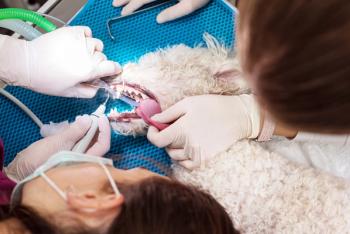
Animal allergies and vet med: I still AHH-CHOO-SE to work with animals
Dying to work with cats, dogs, horses and other animals? Or dying because of them? Consider these strategies to live with your condition and still do the work you love.
Shutterstock.com
I can't remember a time when I didn't want to be a vet. I loved animals always, but it was only after I became a vet and started my own practice-past the point of no return on debt-that I was diagnosed with animal allergies. My doctor, Michael C. Hollie, MD, FAAAAI, FACAAI, a board-certified allergist, admitted after reading my skin tests that if I weren't already in so deep, he would've advised me to choose a different career. But, in reality, animal allergies are an occupational hazard that I probably didn't have when I started out. It turns out that I'm not alone in my struggle.
I polled a Facebook group of veterinary professionals and the response was a little shocking. Some more digging turned up some studies about this topic in other countries. Two separate studies show that 36 to 38% of veterinary professionals are affected by animal allergies1,2. Almost half of these have admitted that allergic disease forced them to change the way they practice. People who have pets in their own homes were excluded from the 2014 Iranian study, so the numbers are falsely low when you consider that in the U.S. nearly all veterinary staff members have their own pets-probably more than one! Chances are, there are people suffering in your practice right now.
But if you're like me, you just can't afford to change the way you practice all that much (and you don't really want to), so you need to some ideas for how to live with the problem.
There are some strategies from my doctor that have helped me, and they might help you too. If you think that you may suffer from animal allergies, please talk with your own doctor about some individual tactics for you. Don't google it (like so many clients do) and diagnose yourself, and don't despair. Even if you're allergic to your job, you're not without options.
• Limit exposure to dander where you can. The proteins that elicit the response in allergy sufferers are found in dander, saliva and urine. Avoid personally clipping or brushing pets' hair because it aerosolizes the protein near you. If there is a nonallergic colleague that can clip for you, it's wise to swap out tasks that blow antigens around your face.
• At the end of your work day, change your clothes and wash your hands, face and hair. Dander can stick to your own hair, and then you roll it around on your pillow in your nose and eyes all night. Many physicians also recommend nasal flush systems to cleanse the antigens away.
• Be aware that certain breeds or species may affect you more. Ask for help with these patients, and don't be ashamed to communicate what you need to protect yourself. Antihistamines and steroid nasal sprays have proven effective to counteract the effects. There are also antihistamine eye drops for itchy eyes. There are multiple brands, so talk with your own doctor about favorites.
• If you can arrange your work schedule to allow you whole days off where you're not exposed to animal dander at all, it can help your immune system reset. Get to know your own body. There are some days when I can't take my dog with me to work in my car and I might even borrow my husband's car. I've learned when I need to let my body have a break.
• If you have personal pets, it's best not to sleep in a room where they spend a lot time. This has been a hard one for me, but I can tell a difference when I'm dander-free when I sleep. Keep personal pets as clean as possible, but avoid being the one to do the grooming at home.
• Hyposensitization injections by a board-certified allergist are also helpful in managing the symptoms of animal allergy.
I'm not only allergic to dogs, cats and horses, but I also have some seasonal allergies as well, so there are times of the year when my patients bring me their allergens and those they have picked up outside to share with me. These are the times when the allergies win the battle, even if not the war, and I still get sick.
Fortunately, with the help of my doctor finding out what the allergens are and giving me a plan to minimize exposure, take immunity breaks, organize my personal pets' lifestyles to accommodate me and a veritable pharmacy of medications to manage my symptoms, I'm able to do what I love to do … with some accommodations.
1. Animal allergen sensitization in veterinarians and laboratory animal workers,
2. Occupational health hazards in veterinary medicine: zoonoses and other biological hazards.
Newsletter
From exam room tips to practice management insights, get trusted veterinary news delivered straight to your inbox—subscribe to dvm360.





